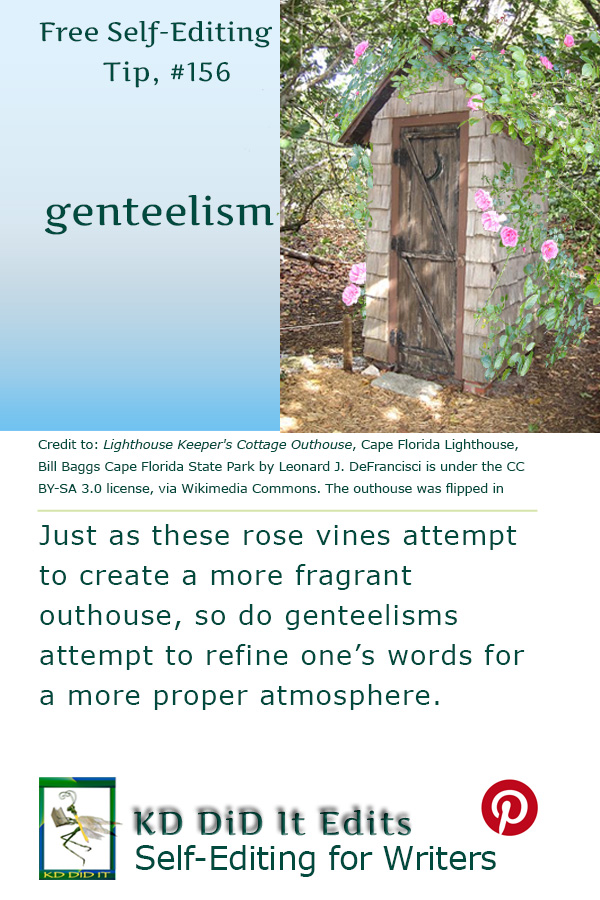Revised as of
9 Feb 2023
It’s a Victorian reaction, genteelism. After all, one can hardly mention leg if a delicate flower of womanhood is within earshot! And do consider how this fragile beauty would swoon if she were to hear of . . . someone . . . sweating!
Today, our genteelisms are politically correct what with mentally challenged, height challenged, weight challenged, __ disabled, etc.
There are also euphemisms for those words or phrases it would be rude to say in mixed company.
Why “Genteelism” is Important to Writers
The concept of genteelism is one which can be applied to characters in a book. Do you want your character to sound like a pretentious idiot or a bureaucrat? Use a genteelism to reinforce that impression. Is your character more of an upperclass sort? Use a word that is less, well, vulgar, my dear.
“Indeed, a good synonym for ‘genteelism’ in the business-writing context is ‘bureaucratese’. And probably no one wants to sound like a bureaucrat when they write . . .” Busch
One way to determine if a word is “appropriate” is to look it up in the dictionary. If its entry includes usage labels such as “nonstandard” or “substandard”, it won’t be a word used by the more prestigious class within a community.
“The point about genteelism is that it indicates primness and snootiness rather than any real dignity of thought and character” (Hitchings).
Genteelism has also influenced how we use I and/or me (see the post on “Me, Myself, and I“) with too many of us believing that one should only use I, as me is only used by the ignorant. And in truth, it’s simply another shibboleth we need to lay by the wayside.
Do consider reading Joan Acocella’s “The English Wars:
The battle over the way we should speak” for the New Yorker. It’s an interesting and fun article on the idea of genteelism and refers to a number of slang dictionaries which might be of interest.
Grammar Explanations is . . .
. . . an evolving list of the structural rules and principles that determines where words are placed in phrases or sentences as well as how the language is spoken. Sometimes I run across an example that helps explain better or another “also known as”. Heck, there’s always a better way to explain it, so if it makes quicker and/or better sense, I would appreciate suggestions and comments from anyone on an area of grammar with which you struggle or on which you can contribute more understanding.
If you found this post on “Genteelism” interesting, consider subscribing to KD Did It, if you’d like to track this post for future updates.
The Not-So-Genteelisms
We tend to think of the genteelisms as applying to high society versus lower classes when actually these euphemisms change depending upon different historical periods, on whether the replacements are being used by parents, children, or teens, etc. Something to consider when setting up your character’s status or setting.
| Common Term | Less-Than-Genteel | Common Term | Less-Than-Genteel | |
|---|---|---|---|---|
| ass | booty bum caboose cheeks nether cheek tush |
menstruation | monthly monthly friend/visitor my aunt came to visit women’s troubles |
|
| condom | French letter rubber |
pee | spend a penny sniff a rose see a man about a dog fix my face answer the call of nature |
|
| die | bite the dust bought the farm dirt nap feet first go the way of all flesh kick the bucket snuff it |
pregnant | knocked up eat for two |
|
| fart | breaking wind pass wind release |
prostitute | business woman callboy ‘ho working girl |
|
| fat | big-boned | shit | doo-doo poo-poo number two drop a bomb |
|
| fucking | act of darkness effing fracking freaking haul (one’s) ashes hide the sausage horizontal mambo make love make the beast with two backs |
toilet | bathroom WC loo ladies gentlemen’s john can washroom restroom comfort station commode little boys room |
|
| groin | barn door family jewels undercarriage |
vomit | drive the porcelain bus get sick ralph |
C’mon, get it out of your system, bitch, whine, moan . . . which words are your pet peeves? Also, please note that I try to be as accurate as I can, but mistakes happen or I miss something. Email me if you find errors, so I can fix them . . . and we’ll all benefit!
Satisfy your curiosity about other Grammar Explanations by exploring its homepage or more generally explore the index of self-editing posts. You may also want to explore Book Layout & Formatting Ideas, Formatting Tips, Grammar Explanations, Linguistics, Publishing Tips, the Properly Punctuated, Word Confusions, Writing Ideas and Resources, and Working Your Website.
Resources for Genteelism
Some of these links may be affiliate links, and I will earn a small percentage, if you should buy it. It does not affect the price you pay.
Busch, Simon. “Are Your ‘Good Manners’ Letting You Down?.” Writing Skills.com. n.d. Web. n.d. <http://writing-skills.com/good-manners-letting/>.
Fowler, H.W. A Dictionary of Modern English Usage. Oxford University Press, 1926. <https://amzn.to/3lhBf5D>. Print.
Hitchings, Henry. The Language Wars: A History of Proper English. Farrar, Straus and Giroux: 2011. <https://amzn.to/3JUMwmX>. Ebook.
Kidder, Tracy & Richard Todd. Good Prose: The Art of Nonfiction. New York: Random House, 2013. p 108. <https://amzn.to/3lpdyIT>Print.
Nordquist, Richard. “Genteelism (Language).” Grammar. n.d. Web. n.d. <http://grammar.about.com/od/fh/g/Genteelism.htm>.
Pinterest Photo Credits:
Lighthouse Keeper’s Cottage Outhouse, Cape Florida Lighthouse, Bill Baggs Cape Florida State Park by Leonard J. DeFrancisci is under the CC BY-SA 3.0 license, via Wikimedia Commons. The outhouse was flipped in Photoshop. Couldn’t find the roses images.


